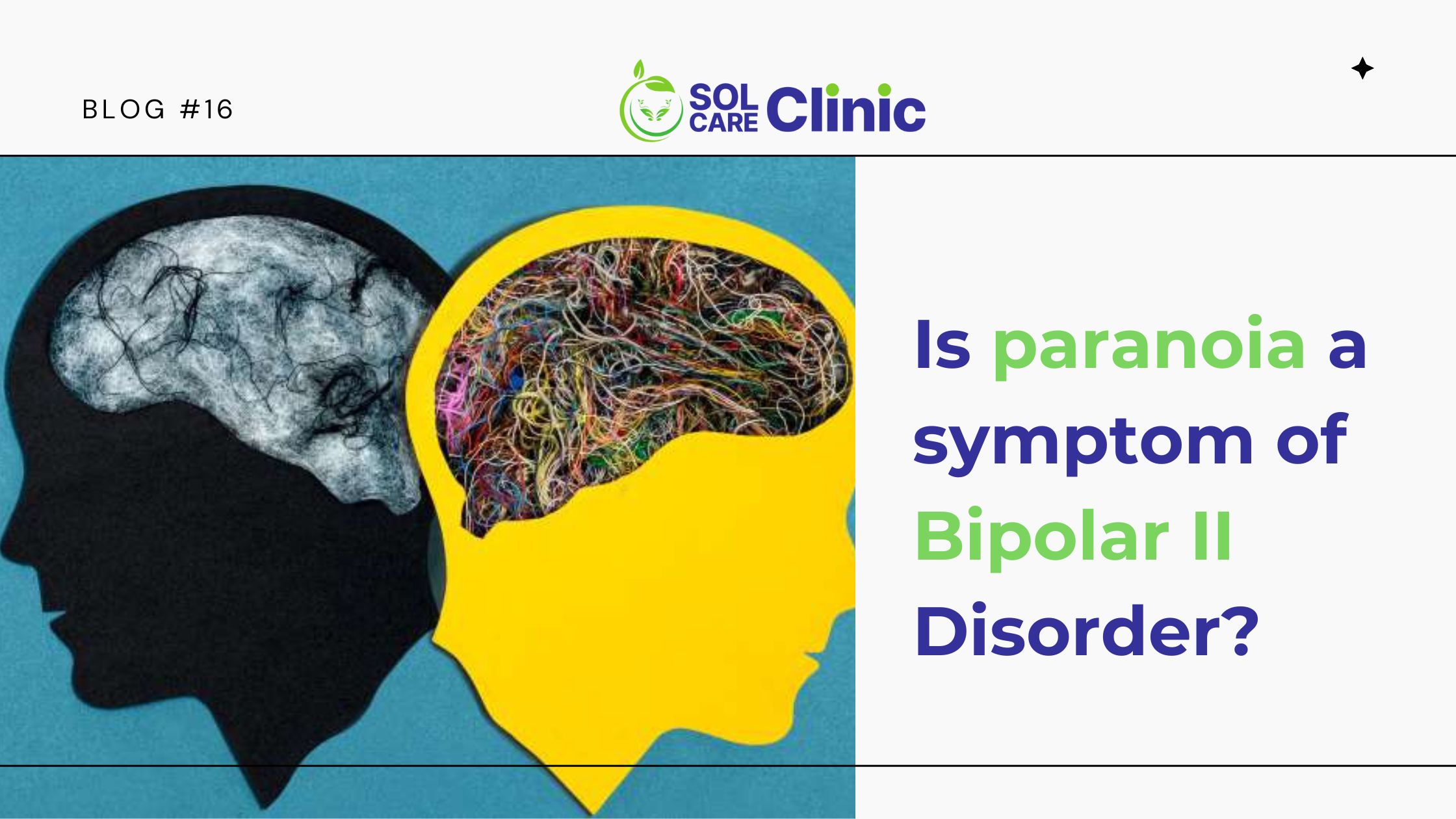Bipolar disorder, as reported by the National Institute of Mental Health (NIMH), impacts around 2.8% of adults in the United States annually. Within this group, Bipolar II disorder stands out as a noteworthy subtype.
What is Bipolar II Disorder?
Bipolar II Disorder is a type of bipolar issue portrayed by times of depression and hypomania, a milder type of mania. Dissimilar to Bipolar I Disorder, which includes all-out hyper episodes, Bipolar II includes episodes of hypomania and significant depression. Hypomanic episodes are less severe than hyper episodes and don’t prompt the very outrageous ways of behaving that can happen in Bipolar I. Notwithstanding, the depressive episodes in Bipolar II can be significant and weaken.
What is Paranoia?
Suspicion is a side effect in which an individual experiences silly and industrious sensations of being persecuted, watched, or targeted by others. This can range from gentle sensations of doubt to extreme delusional reasoning, where the individual is persuaded that others are contriving against them. Paranoia can affect an individual’s everyday existence, prompting disconnection, stressed connections, and difficulties in working.
Paranoia as a Side Effect of Bipolar II Disorder
While Paranoia is all the more regularly connected with psychotic disorders like schizophrenia, it can likewise happen in people with Bipolar II problems, especially during depressive episodes. The extreme lows of a depressive stage can prompt twisted thinking and elevated anxiety, which can appear as suspicion. This suspicion in Bipolar II usually is less severe than in Bipolar I; however, it can, in any case, be troubling and impairing.
Causes and Triggers
A few elements can add to the development of paranoia in people with Bipolar II problems:
-
Chemical Imbalance
Neurotransmitter imbalances in the mind can influence temperament guidelines and discernment, prompting side effects like distrustfulness.
-
Stress and Trauma
High-stress levels or a background marked by injury can set off distrustfulness, especially during burdensome episodes.
-
Genetic Factors
A family background of bipolar problems or other psychological well-being conditions can improve the probability of encountering distrustfulness.
-
Medication Side Effects
Specific prescriptions used to treat bipolar confusion can have incidental effects that incorporate neurosis or other psychiatric side effects.
Impact on Daily Life
Paranoia can seriously affect the personal satisfaction of somebody with Bipolar II disorder. It can lead to:
-
Social Isolation
Doubt and apprehension about others can make people withdraw from social cooperation and connections.
-
Work Difficulties
Distrustfulness can debilitate focus and lead to clashes with associates, influencing position execution and vocation possibilities.
-
Strained Relationships
Industrious doubt and doubt can strain associations with loved ones.
-
Increased Anxiety and Depression
The pressure of managing distrustful considerations can intensify tension and discouragement, making an endless loop of demolishing side effects.
Treatment and Management
Powerful administration of distrustfulness in Bipolar II disorder includes a mix of prescription, treatment, and way-of-life changes:
-
Medication
Temperament stabilizers, antipsychotics, and antidepressants can assist with dealing with the side effects of Bipolar II disorder and decrease neurotic considerations. Working intimately with a medical services supplier is vital to track down the right medicine and measurements.
-
Psychotherapy
Cognitive-behavioral therapy (CBT) can be especially effective in addressing jumpy considerations. CBT assists people with testing unreasonable convictions and fosters better reasoning examples.
-
Stress Management
Procedures like care, reflection, and unwinding activities can assist with diminishing generally speaking feelings of anxiety, which can, thus, lessen neurosis.
-
Healthy Lifestyle
Standard activity, a fair eating regimen, and sufficient rest can help balance one’s mindset and improve overall emotional well-being.
-
Support Systems
Building severe strength areas for an organization of family, companions, and care groups can offer close-to-home help and lessen sensations of detachment.
Living with Bipolar II and Paranoia
Living with Bipolar II disorder and neurosis can be testing; however, with the right treatment and backing, people can lead satisfying lives. Here are a few ways to oversee day-to-day existence:
-
Stay Informed
Teaching oneself about Bipolar II disorder and neurosis can help in understanding and dealing with the condition. Information enables people to perceive side effects early and look for proper assistance.
-
Follow Treatment Plans
Sticking to endorsed medicine and treatment plans is critical for overseeing side effects. Discussing side effects consistently with medical care suppliers and reporting any progressions is vital.
-
Build a Routine
A daily schedule incorporating standard rest patterns, feast times, and actual work can stabilize the temperament and diminish temperament vacillations.
-
Practice Self-Care
Exercises that promote unwinding and prosperity, such as leisure activities, reading, or investing energy in nature, can improve psychological wellness.
-
Reach Out for Support
Conversing with believed companions or relatives around encounters can alleviate close-to-home situations. Support bunches for people with bipolar confusion can likewise offer a feeling of local area and understanding.
End Note
Paranoia is a difficult side effect that can happen in people with Bipolar II disorder, especially during depressive episodes. Understanding the idea of Bipolar II disorder and the elements adding to paranoia is fundamental for viable administration. With suitable treatment, backing, and taking care of oneself, people can deal with their side effects and lead satisfying lives. It’s important to remember that seeking help is a sign of strength, and there are resources available to support those living with Bipolar II disorder and paranoia.





